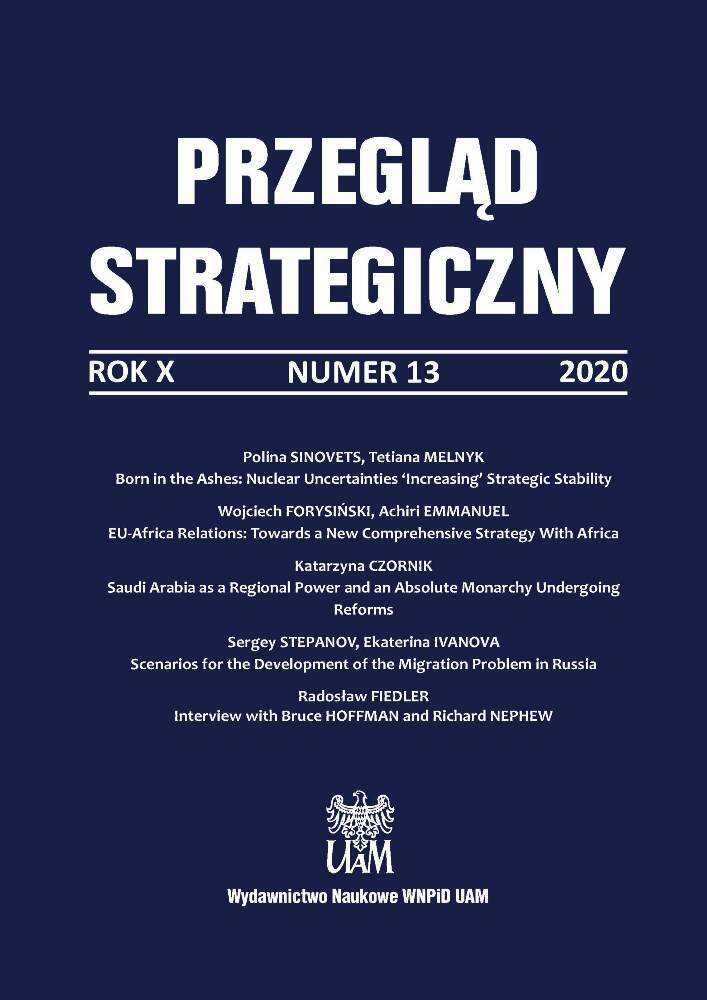Abstract
The purpose of the article is to show how the type of political system (authoritarian regime) influences the shape of regionalism in the Middle East and to what extent this political system determines the features of cooperation between Arab states. To this end, a hypothesis was put forward according to which the authoritarian political system is a key obstacle to the successful integration and unification of the Middle East. Middle Eastern regionalism serves to protect and legitimize the political power of authoritarian leaders, whereas in Europe it guides to peace, stabilization and development. Authoritarian regionalism tends to reduce democratic ambitions and maintain the authoritarian status quo. In order to verify the hypothesis, the following research questions were posed. First, how is the type of political system related to successful integration? Second, can autocracies work effectively together? To verify the hypothesis and answer the research questions, the author referred to the theories of realism, constructivism, neo-functionalism and the typology of political systems to show that there is no single theory that could fully explain the processes in international relations. The conclusion of this article is that regional organizations created by authoritarian states are only symbolic and instrumental in nature and are oriented towards internal policy (the survival of the regime) rather than regional cooperation.
References
Aarts P. (1999), The Middle East: a region without regionalism or the end of exceptionalism?, “Third World Quarterly”, Vol. 20, No. 5.
Allison R. (2008), Virtual Regionalism, Regional Structures, and Regime Security in Central Asia, “Central Asian Survey”, Vol. 27, No. 2.
Ayoob M. (1996), The Third World Security Predicament: State Making, Regional Conflict, and the International System, Boulder.
Barnett M. (1998), Dialogues in Arab Politics: Negotiations in Regional Order. A Narrative of Arab Politics Which Dialogues Among Which Arab States, New York.
Barnett M., Solingen E. (2007), Designed to fail or failure of design? The origins and legacy of the Arab League, in: Crafting cooperation: regional international institutions in comparative perspective, (eds.) A. Acharya, Al. Johnston, New York–Cambridge.
Bellamy A. (2004), Stalled integration and perpetual war: The Gulf Cooperation Council, in: Security Communities and their Neighbours Regional Fortresses or Global Integrators?, (eds.) A. Bellamy, New York.
Bohr A. (2004), Regionalism in Central Asia: New Geopolitics, Old Regional Order, “International Affairs”, Vol. 80, No. 3.
Brynen R., Moore P., Salloukh B. F., Zahar M. (2013), New Horizons in Arab Politics, in: Beyond the Arab Spring: Authoritarianism and Democratization in the Arab World, (eds.) R. Brynen, P. Moore, B. F. Salloukh, M. Zahar, New York.
Buzan B., Waever O. (2003), Regions and Powers: The Structure of International Security, Cambridge.
Collins K. (2009), Economic and Security Regionalism among Patrimonial Authoritarian Regimes: The Case of Central Asia, “Europe-Asia Studies”, Vol. 61, No. 2.
Dziekan M., Zdulski K., Bania R. (2020), Arabska wiosna i świat arabski u progu XXI wieku, Łódź.
Fawcett L., Gandois H. J. (2010), Regionalism in Africa and the Middle East: Implications for EU Studies, „Journal of European Integration”, Vol. 32, No. 6.
Ferabolli S. (2015), Arab regionalism. A post-structural perspective, New York.
Goodin R. (2010), The Oxford Handbook of International Relations, Oxford.
Haas E. (1961), International integration: The European and the Universal Process, “International Organization”, Vol. 15, No. 3.
Harrison R. (2018), Regionalism in the Middle East: an impossible dream?, „Orient”, No. 59. Vol. 1.
Kneuer M., Demmelhuber T., Peresson R., Zumbragel T. (2018), Playing the regional card: why and how authoritarian gravity centers exploit regional organizations, “Third World Quarterly”, Vol. 40, No. 3.
Legrenzi M. (2013), Regionalism and regionalization in the Middle East: options and challenges, International Peace Institute.
Lipa M. (2016), Autorytaryzm i liberalizacja gospodarcza w Egipcie, Warszawa.
North D. C., Wallis J. J., Webb S. B., Weingast B. R. (2007), Limited Access Orders in the Developing World: A New Approach to the Problems of Development, World Bank Policy Research Working Paper Series 4259.
Obydenkova A., Libman A. (2019), Authoritarian Regionalism in the World of International Organizations. Global perspectives & the Euroasian enigma, Oxford.
Pakt Ligi Państw Arabskich (1945), in: Zbiór dokumentów (1946), (ed.) J. Makowski, No. 2, tome 5, s. 47–59.
Richards A., Waterbury J. (1990), A Political Economy of the Middle East – State, Class, and Economic Development, Boulder.
Russo A., Stoddard E. (2018), Why do Authoritarian Leaders do Regionalism? Ontological Security and Eurasian Regional Cooperation, “The International Spectator”, Vol. 53, No. 3.
Salame G. (1988), Inter-Arab Politics: The Return to Geography, in: The Middle East: Ten Years After Camp David, (ed.) W. Quandt, Washington.
Söderbaum F. (2010), With a Little Help From My Friends: How Regional Organizations in Africa Sustain Clientelism, Corruption and Discrimination, http://www.pol.gu.se/digitalAssets/1316/1316597_soderbaum.panel1.pdf.
Thompson K.W. (1960), Political realism and the crisis of world politics, Princeton.
Tripp C. (1995), Regional Organizations in the Arab Middle East, in: Regionalism in World Politics: Regional Organization and International Order (eds.) L. Fawcett, A. Hurrell, New York.
Valbjørn M. (2016), North Africa and the Middle East, in: The Oxford Handbook of Comparative Regionalism, (eds.) T. Börzel, T.Risse, Oxford.
Walt S. M. (1999), The origins of alliances, New York.
Yassine-Hamdan N., Pearson F. S. (2014), Arab approaches to conflict resolution. Mediation, negotiation and settlement of political disputes, London–New York.

